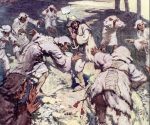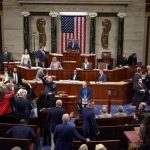Let my people go; how organising in a legally cultural separate enclave destroys Pharaoh
UK Government has mounted a major psychological operation for nearly a year, and some people will undoubtedly be feeling worn down and oppressed; this article, then, is to remind that when a great number of individuals act as a community in their liberty irrespective of a great lie that would constrain them, and even cause them to be punished, then there are forces at work that cannot be resisted.
There’s more going on in the story of the great plagues of Egypt than the likes of the Charlton Heston movie, The Ten Commandments, portrays, and so this is why people in formerly Christian societies perhaps don’t understand the crucial lesson in good versus evil that it teaches, with most (if not all) interpretation missing the point entirely. The exodus wasn’t just a case of proving the god of the Hebrews was more powerful than Egyptian gods so that Pharaoh should do as Moses demanded of him. In fact, the plagues of Egypt could be considered a form of self-infliction that a technocratic government would find politically useful as a crisis. The big stumbling block was an enclave of people who had been organised so that Pharaoh’s power was fatally weakened as well.
The Pharaoh of Moses (David Rohl calculates that his name was Dudimose), was made to suffer a complete collapse of mystical and political authority amongst the native Egyptian population. The Israelites became aware that they had a legal culture apart from Egypt, and that a code of law by which they could rally around and form an identity, had superiority over the legal situation in which they were a slave caste in Egypt (in a similar way that the Helots were a slave class to the Spartans).
It is possible to understand that the text of Exodus is telling us that the Israelites in Egypt had lost touch with their relationship with the god of Abraham – but more importantly, a moral scheme (a natural law, yet to be codified) – and that Moses was reintroducing the appreciation after his own education amongst the Midianites; this evidence comes in the form of the Israelites’ need to worship God being brand new news to Pharaoh when Moses presented the idea.
And then there is the form of the demand of Pharaoh, which was a request to release the Israelites from the hold that he had over them. It was as though the Israelites’ bondage was a matter of a contract which Pharaoh must waive, or as if there never had been, as much as anyone could appreciate, a claim on the Israelites from outside the religio-legal scheme of Egyptian society.
In fact, the initial request that is put to Pharaoh is that the Israelites leave temporarily – apparently – to go out into the desert and worship God. This is a detail that appears to cause some perplexion for some people in certain circles because if God is all powerful (so that he can even command insects), and therefore could free the Israelites at any time, why is Pharaoh, i) issued a request to comply, and ii) given a lesser demand?
The answer must be that in this way Moses was able to create the fullest collapse of phaoronic authority by initially giving Pharaoh softer options which were easier to agree with, so that when he didn’t, he would look all the more unreasonable in the light of the terrible plagues that would be seen to be caused by his refusal. Indeed, there is a key line in the text where Pharaoh is asked, via Moses, “how long wilt thou refuse to humble thyself before me?”. To understand the exodus properly, we need to appreciate that it was in fact an exercise in undermining the Pharaoh amongst his own subjects, and the legal approach was God’s side acting reasonably in the eyes of Egyptian society. It was the Egyptian public, and its support, that facilitated the Pharaoh’s ability to retain the Israelites. And although his ability to police the Israelites might have been affected by the plagues, his ability to keep the Israelites forcibly as slaves was not affected by them. Indeed, Egypt only became militarily vulnerable after an army went into the desert after the Israelites, and was destroyed in another catastrophe.
But, of course, first of all, the Israelites had to understand that they were as a people separate from the Egyptian religio-legal order. When Moses first returned into Egypt after being sent there by God, he first goes to the Israelite elders, not to Pharaoh – because the activation of the Israelites would have been the primary consideration. Via Aaron, Moses’ ambassador to them, the Israelites learnt about that which had transpired between Moses and God, and of their status.
Then, in the interview between Aaron, Moses and Pharaoh, we learn that the Israelites have stopped work – evidently something unheard of – so what this perhaps indicates is that the Israelites have organised so as to attempt to create leverage for the request to journey into the desert for three days to worship.
Pharaoh’s response was to stop supplying straw for brick making, so that the Israelites had to find their own stubble in the fields; he claimed that the Israelites new found desire to worship their god (of whom he told Moses he’d never heard) meant that they must be idle, and so in need of more work.
Of course, faced with a new situation where they had to do more work to produce the same tally of bricks, or else receive punishment beatings, the Israelites became alienated from Moses – and this would have been Pharaoh’s aim. He interrupted the ability to organise against the Egyptian political schema by turning people against Moses.
What was to come, then, which was the showdown with Moses’ rod turned into a serpent versus those created by Egyptian magicians, where the others were devoured by the former, was an appropriately decorous demonstration of God’s power against Pharaoh, and his authority over the Israelites. Moses went head to head with Pharaoh, and won. Undoubtedly, the outcome of the incident and especially the symbolism would have reassured many Israelites about Moses’ ability to have success in his endeavours.
When the disasters started, it was this confidence that Pharaoh was trying to knock when he would have his magicians replicate or rationalise the phenomenon that constituted a number of early plagues. Eventually, the court magicians (probably wise men and conjurers) were defeated by the plague of lice, and had to declare to Pharaoh that it was the work of the Hebrew God. Given that this plague seems to have led directly to the plague of flies, which was spared Goshen, the place where the majority of Israelites lived in Egypt, failure of the magicians at this juncture in the course of events is perhaps linked to how the text specifically states thereafter that the Israelites are spared the ill effects of any current plague.
It suggests that the Israelites had been fully won around to Moses, and at this stage could organise to limit the damage against themselves by disasters to come.
When Pharaoh’s magicians themselves ultimately fall foul of the plague of boils, it is a terminal Public Relations defeat for the Egyptian ruling class. Moreover, ahead of the very next plague, an explicit warning was given by which Egyptians could take advantage, and avert calamity by taking their cattle from the fields. So, after crushing the mystical power of Pharaoh, Moses was directly working on the loyalties of the Egyptians, and indeed it is reported right at the end of the entire episode that the Egyptian public held Moses in great esteem, and we are given a clue that the Egyptians might have been trading with the Israelites (thus perhaps developing different feelings for them) for the necessities that they would increasingly lack, because we are given the puzzling information about how Israelites would “borrow” gems and precious metal from their Egyptian neighbours. The received idea is that the Egyptians resented the Israelites so much that they paid them to leave, but reality is probably more to do with undercutting Pharaoh’s power over his own people by giving the Egyptian’s an avenue, through trade with the Israelites, to mitigate what Pharaoh was bringing upon them. Indeed, there comes a time when Pharaoh’s “servants”, possibly meaning his ministers and priests, were telling him to concede and let the Israelites go. It is clear that through the activity of the Israelites underneath the series of natural calamity, that demands attention and gets the credit, the damage being done to the political order would have been immense.
The last plague, of course, would be the final straw in this respect, because obviously the Egyptian ruling elite became so desperate that it demanded that the population sacrifice its first born. It’s not that Egypt’s priesthood would have necessary believed that it could placate one of Egypt’s gods that they would have the people to believe in, but it would be an act to shore up Pharaoh’s political authority.
It’s really important to understand that maintenance of ancient technocracy depended on the people thinking that the political order would guarantee cosmological order. As FBEL readers are told over again, the model where collectivised responsibility for averting or bringing about the end of the world is a thing that the current ruling class, made from the very same cast as the pharaohs, is bringing back in modern times. In this context, the really significant thing about Moses is that, with the new ideas of individual responsibility, he introduced the way that man could live without the potential collectivised guilt for making the world end. It was the first major blow against Babylonian technocracy, and set the path for the work of Yeshua a millennium and a half later, who enabled further extraction, across more or less the same intervening period, from the ancient slave system in various degrees (his movement suffered by being co-opted by Rome, and only recovered somewhat with Protestantism – which itself is tainted by freemasonry; it’s not an uncomplicated state of affairs).
Rendering Pharaoh’s magicians useless, the plagues would have shaken the Egyptian’s religio-political world. First of all it would have shown that Pharaoh could not live up to his end of the bargain of ensuring that the sun would rise every day (the plague of darkness would have made this especial point), and secondly it would have shown that those who did not subscribe to the schema, even in the midst of it, didn’t necessarily suffer. It would be shown that the “end of the world” depended on circumstances brought about by political culture.
So, when compelled to sacrifice their own first born children, quite out of fear, Egyptians would not have refused, but they would have known it was futile. The awful exercise of mass sacrifice would have seen the final collapse in support for the ruling elite. And the author is convinced that the Israelites would have been expected to take part, but because of their self-containment, were able came up with a plan to sacrifice the livestock that they had and the Egyptians hadn’t, and deceived the Egyptian authorities into believing there had been compliance by the painting of blood on the doorposts of their houses.
In the end, Pharaoh let the Israelites go because there was nothing he could do against them within the bounds of Egyptian civilisation, because in the end he did not have the support of his people. Instead, he sent the Israelites into the desert so that his army could deal with them on a field of battle; maybe the idea was to return some wealth to Egypt and distribute to the people to win back favour. Do not forget that after Pharaoh decreed that there would be no straw for bricks, even at the very start of the whole saga, there was this: “Then the LORD said unto Moses, Now shalt thou see what I will do to Pharaoh: for with a strong hand shall he let them go, and with a strong hand shall he drive them out of his land.”
The rest, as they say, is history, and the Egyptians soon after became a conquered people when another group of Asiatic people invaded, in an adventure that had been made all the easier by the Israelites departure, and the means by which it was accomplished.
The lesson that the episode teaches is the importance of organising within a cultural enclave that sees itself separated from the authority of the government in order to mitigate the way that the government is bringing disaster upon a country. What people might not get is that Pharaoh and the ruling class would have expected to survive the plagues of Egypt. A tool of technocracy is the use of crisis to create opportunity for power. Although the Egyptian public would have suffered immensely, their reaction would have been controlled by government lying. When the UK Government throws Britain into a world war, it does the very same thing. When UK Government set up an economic blockade against British businesses in the name of Covid-19, it did the very same. In Pharaoh’s case, the same would have applied were it not for the Israelites being contrary.
So take heed, all you people in Britain who understand that you must be, and are legally culturally separate from the authorised mainstream because of your subscription to common law; you are the Israelites. If you organise together, and serve as an example to the “Egyptians” – that is, the people who volunteer to be subject to UK Government – and mitigate for yourselves the disasters that UK Government cause with the intention of weakening you, you have the potential to make the authority and legitimacy of UK Government collapse.
In previous articles, UK Government has been compared with the Morlocks farming Eloi, and the Spartans preying on the Helots, and now they are firmly identified with the Pharaohs – and in keeping with the theme of this article, (and we can use this terminology symbolically if it individually suits) the time has come again for events whereby Pharaoh “mayest know that there is none like unto the Lord our God”.
Although it’s a long road, identifying as a separate nation – or the real nation (the author suggests that this is the Commonwealth; the country without a Crown) – with loyalties other than to the UK Government is the fundamental first step to make. The objective in the first instance is to create common law jurisdictions, where it is hard for the “Pharaoh” and agents to persecute people going about private business that government would like to arbitrarily deem is restricted to them; this incorporates opening and operating businesses just as much as walking down a street without being interrogated by police (which they are not allowed to do in common law). Before that, however, a community must be created in every town and village that has decided that it must separate from the schema by which it is governed by UK Government. A suggested way of starting to do this is for people to organise together to home school groups of children, even jointly paying a professional tutor to do it – but it is one way, and it’s not useful if it’s up to the author to spoon feed specific ideas that people should be having on their own. In the spirit of this piece, the general idea is to be redeemed at first, and that is a lot already to accomplish. (The final destruction of the oppressor, and self-government is inextricably linked, and comes later [see Action To End The Interminable Unlawful Lockdown – link]).
Further reading:
The Science Of The Age Versus Technocratic “Magic”; There Can Only Be One Outcome (link)
Action To End The Interminable Unlawful Lockdown (link)
Exiting Babylon: The Only Way To Escape Being Prey For UK Government In Perpetuity (link)
Covid-19 As A Modern Day Variant Of An Antique Technocratic Control Device (link)


















